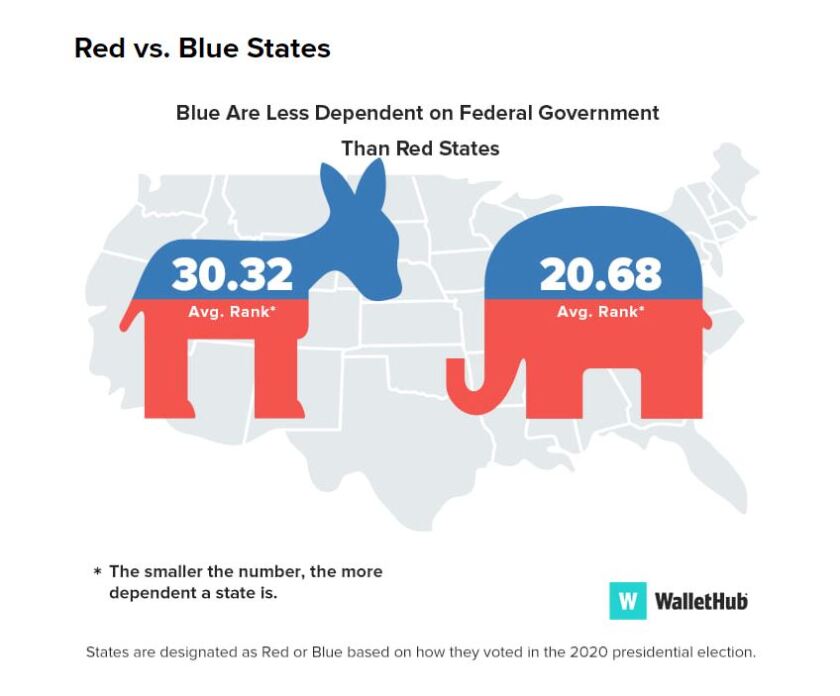The first round of stimulus relief funneled $150 billion in relief to states, while the second round passed in December 2020, didn’t provide any direct payments. For the American Rescue Plan Act, passed in March, states will receive $195 billion in payments. Yet some states will receive far more than others. A new report from WalletHub reveals to what extent each state is reliant upon the federal government for assistance, and which states are more self-sufficient.
Source: WalletHub
WalletHub compared all 50 states across two key dimensions: State Residents’ Dependency and State Government’s Dependency. Each dimension was evaluated by three metrics, which were each weighted through a double 50-point-based system. Within State Residents’ Dependency, return on taxes paid to the federal government was worth 37.5 points and share of federal jobs was worth 12.5 points; within State Government’s Dependency, federal funding as a share of state revenue was given a full weight of 50 points.
Based on these calculations, New Mexico, at 86.57 points, ranked as the most federally dependent state overall and the state with the greatest resident dependency. Louisiana’s state government ranked the most dependent on the federal government. Kansas ranked least federally dependent overall, earning just 10.62 points. Delaware’s residents and Virginia’s state government were ranked least federally dependent of those categories.
Eight of the 10 most federally dependent states were Republican, while seven of the 10 least federally dependent states were Democratic, which suggests that overall Republican states are more dependent upon federal assistance than Democratic ones.

Zoe Manzanetti
Additionally, when the amounts of contracts, grants and other financial assistance from the federal government that each state received were analyzed, those figures also supported the Republican dependency trend. The highest amounts of federal grants and other financial assistance were given to four of five Republican states in each category. Only two of the five states that received the most federal contracts voted Republican in the 2020 presidential election, but four of five of the states that received the least supported Joe Biden.
Not all experts agree on how the federal government should determine state allocations or whether some states should subsidize others.
“One of the roles of governments is to create an equitable society,” says Charles E. Menifield, dean of the School of Public Affairs and Administration at Rutgers University-Newark. “Equity is an outcome of a budget decision whether it is stated or unstated. Will the allocation assist a state (person) in improving the well-being of its residents?”
Source: WalletHub
But establishing equity is difficult when there is disagreement as to which programs should be a state and local responsibility and which should be a federal responsibility. Some experts, like Christopher Z. Mooney of the University of Illinois, Chicago, believes that the U.S. Constitution is very clear in its 10th Amendment, that as much should go to the states’ responsibilities as possible. But Miami University’s Mark Morris explains that however the distribution occurs, it will never be perfect and there will always be discrepancy.
“Fair does not mean equal,” he says. “We use a political process to make these decisions, so someone will always consider it unfair no matter what metric is used.”









